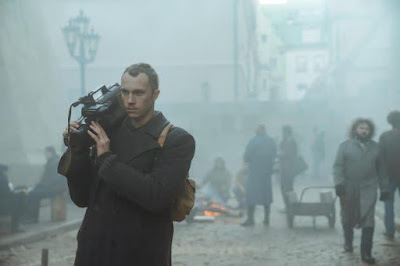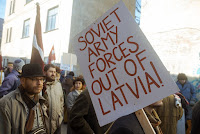Early 1991 was an opportune time to be a film student in the Baltics, because history was exploding daily. It was also a dangerous time for the same reason. Jazis generally supports Latvian independence from their Soviet occupiers, but he has yet to mature to the point he can fully appreciate the gravity of the moment in Viesturs Kairiss’s January, which screens during this year’s Tribeca Film Festival.
Jazis wants to be the next Tarkovsky, which would ordinarily alarm most parents, but his anti-Communist mother is fine with it, along as he gets a draft deferral from his film school. The last thing she wants is to have her son in the Soviet army, potentially in harm’s way, while putting down democratic opposition movements. His father also basically agrees, even though he is a Party member. Unfortunately, Jazis’s drive and talent level will complicate matters.
For a while, his affair with Anna, a pretty fellow film student awakens some passion in him. However, when she falls under the influence of a famous filmmaker, Jazis spirals into depression and apathy. Yet, maybe the Soviet military’s attempts to stifle Baltic activism for independence might awaken him from his lethargy.
Kairiss skillfully uses a textured lo-fi style (including Super8), integrated with genuine historical archival footage, to recreate the tenor of the early 1990s in the Baltics quite vividly and evocatively. You really get a sense of the tension and potential violence that was literally hinging in the air. In one telling moments, Jazis asks an elderly woman if she was scared to deliver the food she baked for demonstrators. “No, I’ve been waiting 50 years for this,” she tells him.
January is highly effective time capsule and mood piece, but Jazis is so moody and sulky, we hardly get a sense of any character there within him. Arguably, many of the minor figures, like Jazis’s parents, resonate more than he and his film school-mates.
Yet, the third act definitely makes the film worth seeing. With minimal dialogue Karlis Arnolds Avots shows how Jazis suddenly matures at light-speed. He and Alise Danovska’s Anna have “oh s***” moments that silently speak volumes.
At times, Kairiss makes you feel like you are at the barricades, which is impressive filmmaking. He captures the confusing atmosphere, without making the on-screen images confusing at all. It definitely comes together to make a powerful film. Highly recommended, January screens again in person tomorrow (6/12) and Friday (6/17), as part of this year’s Tribeca.

